Camponotus (Tanaemyrmex) compressus (Fabricius)
  Iran list Iran list
 Listing as collated from
Bolton (1995: 93): Listing as collated from
Bolton (1995: 93):
Type location India (Formica compressa, Fabricius, 1787:
307, worker; F Smith, 1858b: 14, queen & male) - no images on
Antweb (October 2014)
junior synonyms
indefessa (Formica indefessa, Sykes, 1835:
104, illustrated, worker &
queen, Jerdon, 1851: 119) India
quadrilaterus (Camponotus quadrilaterus
nov. sp., Roger, 1863a: 136, worker; synonymy Forel,
1892j: 240) India
callida (Formica callida, F Smith, 1858b: 18,
minor; synonymy by Emery, 1925b: 98) India
subspecies
brullei (F Smith 1858b: 35, as replacement name for Formica
carinata, Brullé, 1840: 84; subspecies as carinata,
Santschi, 1939d: 82) Canary Islands
cosensis (Camponotus maculatus r sanctus
var. cosensis n.var., Forel,
1904c: 20; Camponotus (Tanaemyrmex) compressus var. cosensis,
Finzi, 1939c; 159, major & minor, records only) Greece
irakensis (Camponotus (Tanaemyrmex) compressus
ssp. irakensis n. ssp., Menozzi, 1927e: 117, illustrated,
major, minor
& queen) Iraq
martensi (Camponotus maculatus subsp Martensi,
Forel, 1907e: 16, major &
minor; Santschi, 1929g: 165, queen) Algeria
nitens (Camponotus compressus (Fab.) sbsp nitens
n. sbsp.,
Bernard, 1953a: 194,
queen) Algeria
occipitalis (Camponotus (Myrmoturba) maculatus
F. r. occipitalis n. stirps,
Stitz, 1917: 352, illustrated,
minor) Algeria
probativus (Camponotus (Myrmoturba) compressus
F. stirps probativus n. st., Santschi, 1921d:
73) Mozambique (separated by me, see below)
pupillus (Camponotus (Myrmoturba) erigens
For. stirps magister v. pupillus n. var.,
Santschi, 1925g: 358; Camponotus (Myrmoturba) compressus stirps
pupillus,
Santschi, 1939d: 83, minor) Morocco
rectinotus (Camponotus maculatus F. r. samius
For. v. rectinotus n. v., Stitz, 1917:
351; Camponotus compressus stirps rectinotus (Santschi,
1921d: 75, minor) Libya
spahis (Camponotus (Myrmoturba) compressus
F. stirps thoracicus F. v. spahis n. var.,
Santschi, 1925g: 357, major, queen & male) Algeria
symiensis (Camponotus maculatus F. subsp. Symiensis
n. subsp.,
Forel, 1910a: 26, minor; subspecies of compressus, Emery,
1920c: 6) Greece
|
Notes 2009 and 2014. The above list is a typical
product
of the Forel-inspired great reluctance to define substantive species
and instead create trinomial and quadrinomial names. Examination of all
the available descriptions and illustrations, together with the fresh
specimens from The Maldives, suggest the following separations are
sensible.
Indo-Arabian
forms; North
African/Mediterranean forms; sub-Saharan Africa forms.
|
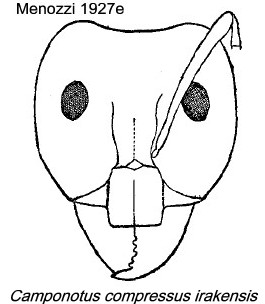 Indo-Arabian type forms - revised status:
Indo-Arabian type forms - revised status:
Type location India (Formica compressa, Fabricius, 1787:
307, worker; F Smith, 1858b: 14, queen & male)
junior synonyms
indefessa (Formica indefessa, Sykes, 1835:
104, illustrated, worker &
queen, Jerdon, 1851: 119) India - no images on Antweb (October
2014)
quadrilaterus (Camponotus quadrilaterus
n.sp., Roger, 1863a: 136, worker; synonymy Forel,
1892j: 240) India - no images on Antweb (October
2014)
callida (Formica callida, F Smith, 1858b: 18,
minor; synonymy by Emery, 1925b: 98) India - no images on
Antweb (October
2014)
irakensis (Camponotus (Tanaemyrmex) compressus
var. irakensis, Menozzi, 1927e: 117, illustrated, major, minor
& queen; synonymy here) Iraq - no images on Antweb (October
2014).
|
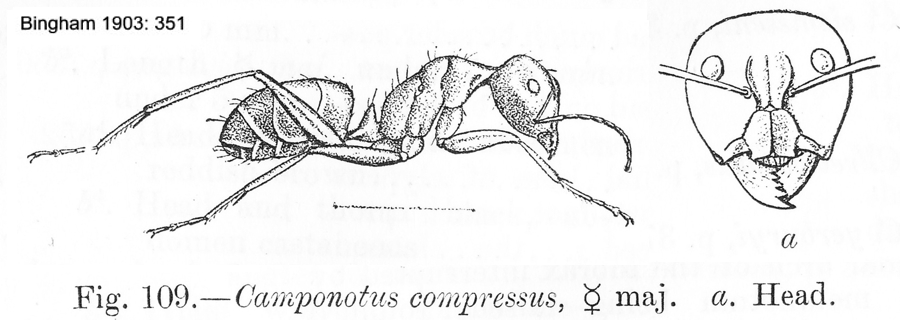 Fabricius's
(1787) description is at Fabricius's
(1787) description is at  , the compressus name relates to
the thorax (alitrunk). Sykes's (1835) description of the type and callida
is at , the compressus name relates to
the thorax (alitrunk). Sykes's (1835) description of the type and callida
is at  . Jerdon's (1851: 119) description is at . Jerdon's (1851: 119) description is at  . F Smith's (1858b) description, with callida,
is at . F Smith's (1858b) description, with callida,
is at  . Roger's (1863a) description of quadrilaterus
is at . Roger's (1863a) description of quadrilaterus
is at  . Forel's (1892j) consideration of the
Indian and Arabian-Persian forms is at . Forel's (1892j) consideration of the
Indian and Arabian-Persian forms is at  . Bingham's (1903) illustrated description
is at . Bingham's (1903) illustrated description
is at  . Menozzi's (1927e) illustrated description
of irakensis is at . Menozzi's (1927e) illustrated description
of irakensis is at  . .
|
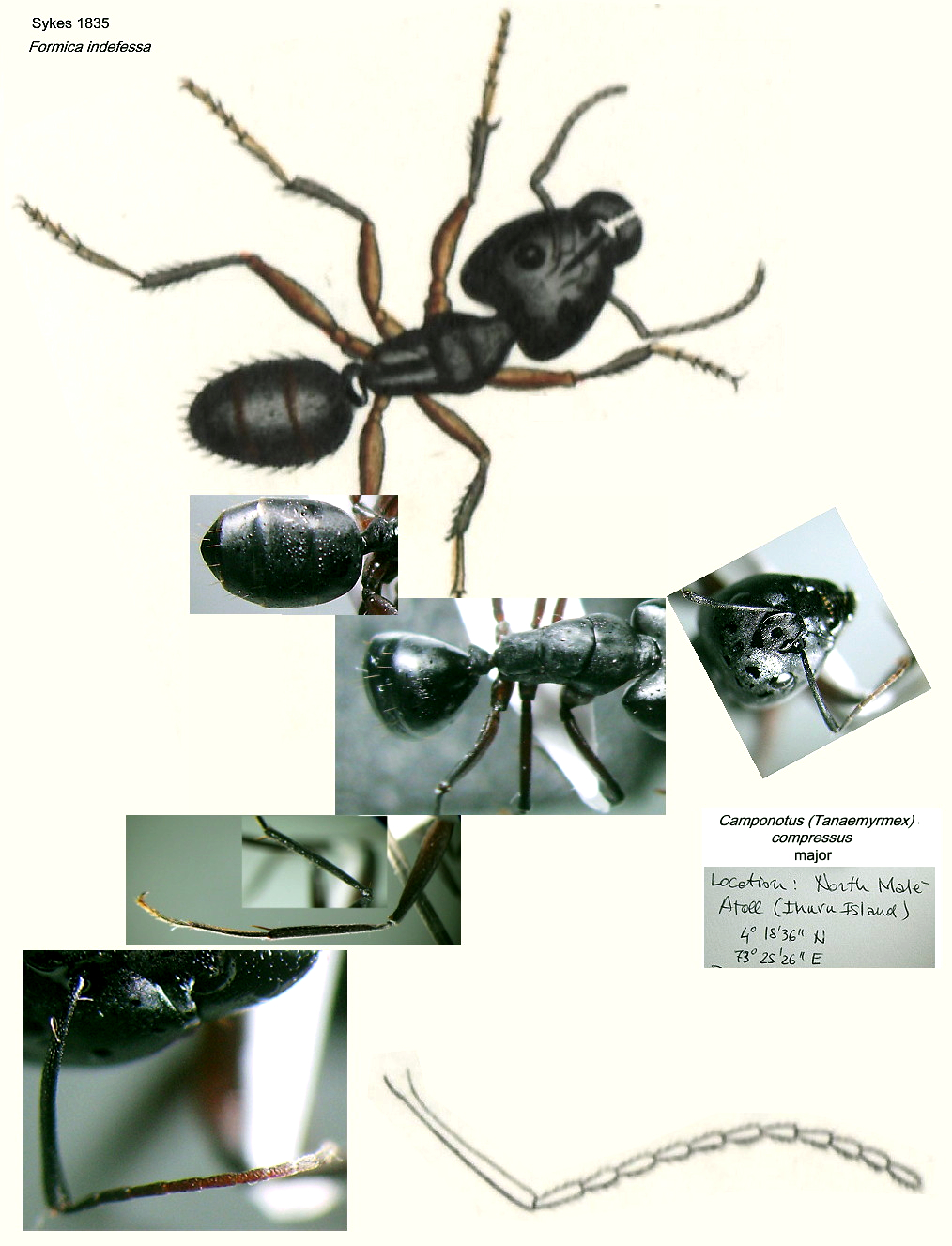 This
photomontage compares a major from The Maldives,
as below, with the Sykes (1835) illustration of Formica indefessa
and is a tribute to the quality of the early illustration by J. O.
Westwood. This
photomontage compares a major from The Maldives,
as below, with the Sykes (1835) illustration of Formica indefessa
and is a tribute to the quality of the early illustration by J. O.
Westwood.
|
Oxford University Museum
specimens
Camponotus (Tanaemyrmex) compressus
B Taylor det.
|
Maldives
M Aita
|
2008
Ihuru Island
4°18'36" N
73°25'26" E
|
North Malé Atoll;
foraging on the ground
|
5
|
 |
Camponotus (Tanaemyrmex) compressus
B Taylor det.
|
India
A Lenoir
145e
|
25.ii.2012
Jaipur
26.93° N
75.82° E
|
431 m
minor
|
1
|
 |
|
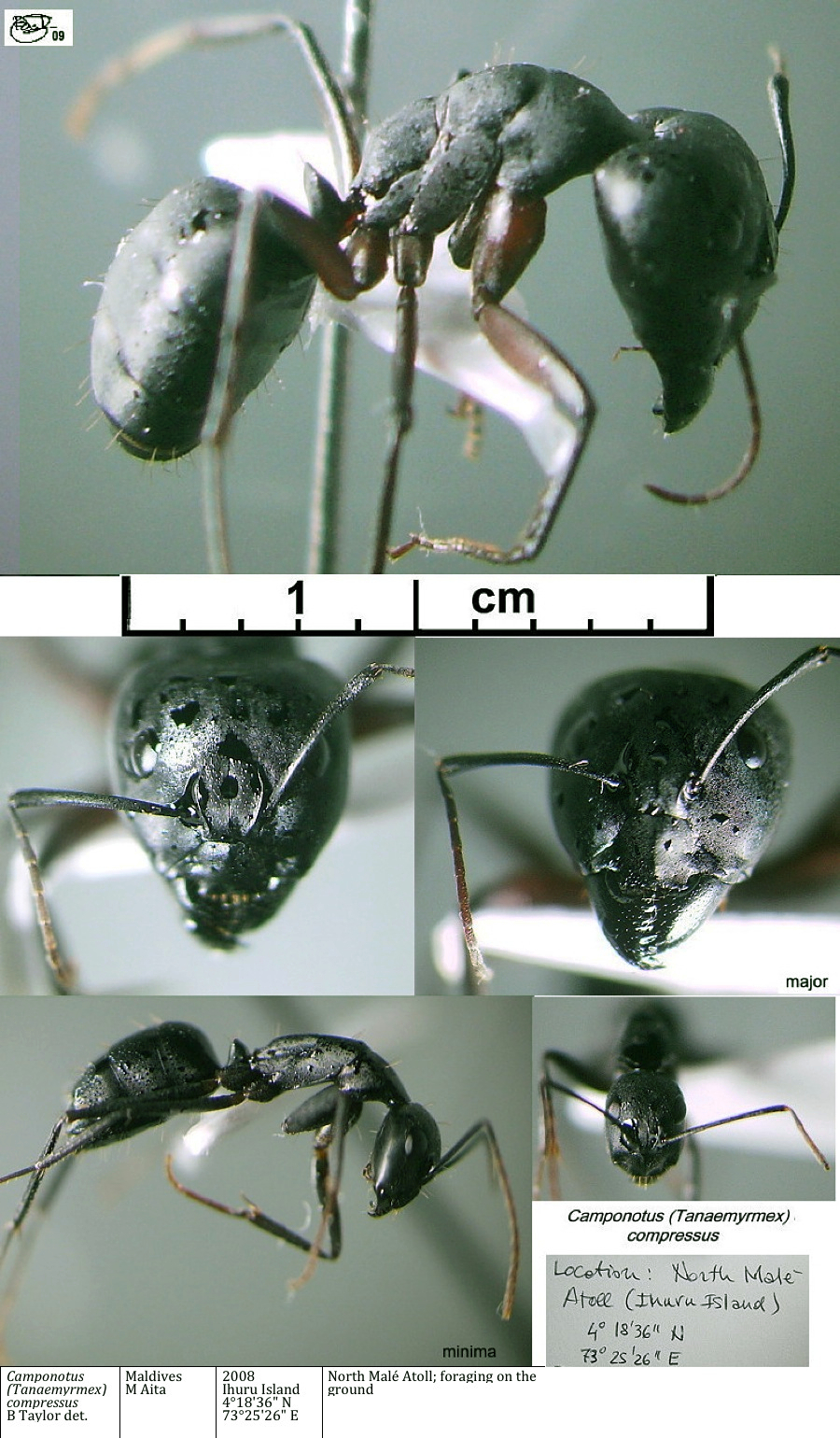 The photomontage
is of workers from The Maldives,
North Malé Atoll, Ihuru Island, collector Marco Aita. The major worker
appears to exactly match Menozzi's description of irakensis.
Bingham gave the sizes as major TL 11-16 mm, minor TL 6-8 mm. Other
images, showing four sizes and activity in the location, can be seen on
the linked page - Maldives. The photomontage
is of workers from The Maldives,
North Malé Atoll, Ihuru Island, collector Marco Aita. The major worker
appears to exactly match Menozzi's description of irakensis.
Bingham gave the sizes as major TL 11-16 mm, minor TL 6-8 mm. Other
images, showing four sizes and activity in the location, can be seen on
the linked page - Maldives.
|
 The
photomontage
is of a minor worker from India, Jaipur, collected
by Alain Lenoir. The
photomontage
is of a minor worker from India, Jaipur, collected
by Alain Lenoir.
|
North
African forms -
brullei (F Smith 1858b: 35, as replacement name for Formica
carinata, Brullé, 1840: 84; subspecies as carinata,
Santschi, 1939d: 82) Canary Islands - no images on Antweb
(October 2014)
cosensis (Camponotus maculatus r sanctus
var. cosensis n.var., Forel,
1904c: 20; Camponotus (Tanaemyrmex) compressus var. cosensis,
Finzi, 1939c; 159, major & minor, records only) Greece
martensi (Camponotus maculatus subsp Martensi,
Forel, 1907e: 16, major &
minor; Santschi, 1929g: 165, queen) Algeria - see http://www.antweb.org/specimenImages.do?code=casent0910201
(this is quite distinct with pale banding on the gaster and light areas
on the lateral alitrunk)
nitens (Camponotus compressus (Fab.) sbsp nitens
n. sbsp.,
Bernard, 1953a: 194,
queen) Algeria - no images on Antweb (October 2014)
occipitalis (Camponotus (Myrmoturba) maculatus
F. r. occipitalis n. stirps,
Stitz, 1917: 352, illustrated,
minor) Algeria - no images on Antweb (October 2014)
pupillus (Camponotus (Myrmoturba) erigens
For. stirps magister v. pupillus n. var.,
Santschi, 1925g: 358; Camponotus (Myrmoturba) compressus stirps
pupillus,
Santschi, 1939d: 83, minor) Morocco - see http://www.antweb.org/specimenImages.do?code=casent0911928
(quite distinct in head shape and colouration)
rectinotus (Camponotus maculatus F. r. samius
For. v. rectinotus n. v., Stitz, 1917:
351; Camponotus compressus stirps rectinotus (Santschi,
1921d: 75, minor) Libya - no images on Antweb (October 2014)
spahis (Camponotus (Myrmoturba) compressus
F. stirps thoracicus F. v. spahis n. var.,
Santschi, 1925g: 357, major, queen & male) Algeria - no
images on Antweb (October 2014)
symiensis (Camponotus maculatus F. subsp. Symiensis
n. subsp.,
Forel, 1910a: 26, minor; subspecies of compressus, Emery,
1920c: 6) Greece - no images on Antweb (October 2014).
|
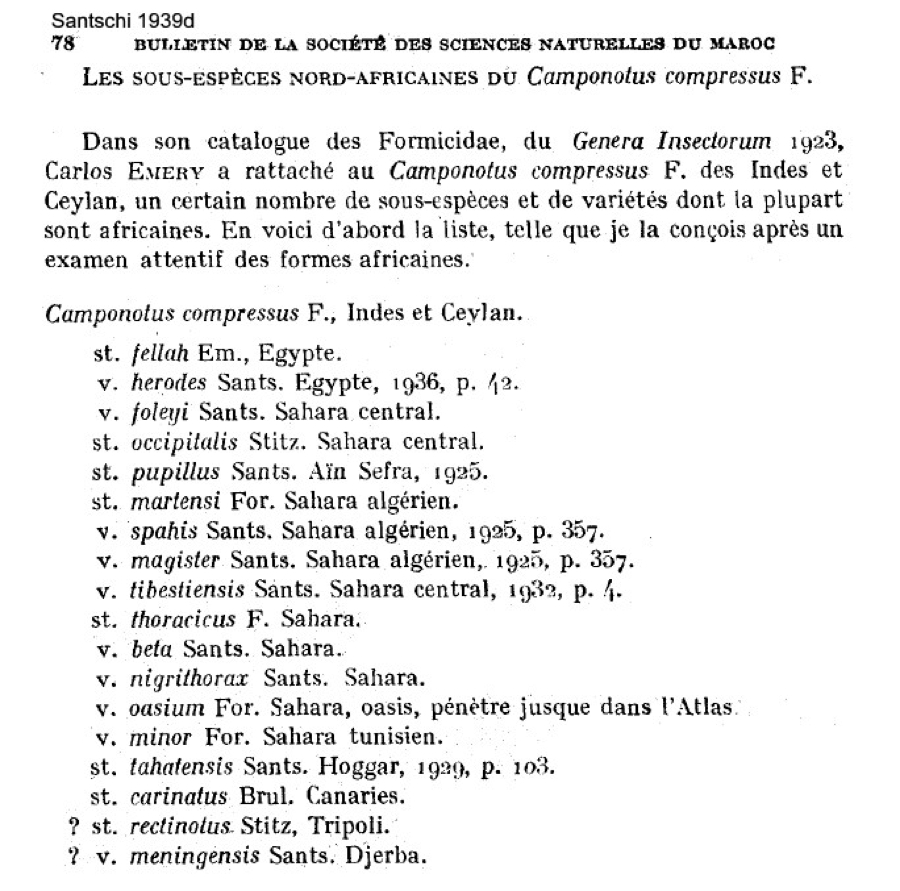 Summary list (right)
by Santschi (1939d), with the
full text at Summary list (right)
by Santschi (1939d), with the
full text at  . .
Forel's (1907e) description of cosensis is at  . Forel's (1907e) description of martensi
is at . Forel's (1907e) description of martensi
is at  . Forel's (1910a)
description of symiensis is at . Forel's (1910a)
description of symiensis is at  . Stitz's (1917) description of occipitalis
is at . Stitz's (1917) description of occipitalis
is at  . Stitz's (1917)
description of rectinotus is at . Stitz's (1917)
description of rectinotus is at  . Santschi's (1923e) description of pupillus
is at . Santschi's (1923e) description of pupillus
is at  . Santschi's (1925g) description of magister
is at . Santschi's (1925g) description of magister
is at  . Santschi's (1925g) description of spahis
is at . Santschi's (1925g) description of spahis
is at  . Santschi's (1932f) description of magister
tisbestiensis is at . Santschi's (1932f) description of magister
tisbestiensis is at  . Bernard's (1953a) description of nitens
is at . Bernard's (1953a) description of nitens
is at  . .
|
Camponotus
fellah was recognised as a distinct species by Pisarski (1971b:
728). Camponotus
thoracicus was revived as a distinct species by Pisarski
(1971a: 674; without details). Camponotus oasium
was revived as a distinct species by Collingwood (1961a).
The Greek/Aegean forms, cosensis and symiensis
appear to be significantly smaller and presumably are likely to be
closer to C. fellah as the Middle Eastern/East Mediterranean
species.
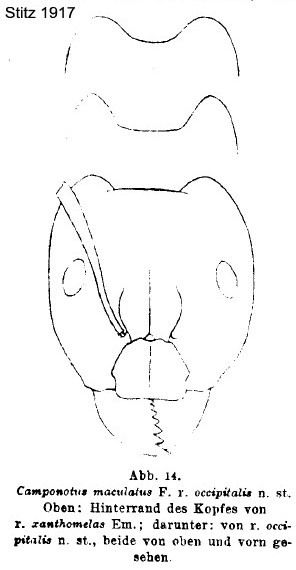 To deal with the remaining North African forms, as
described by Forel (1907e), martensi has the head shape shown
by Stitz for occipitalis, i.e. with HL 4.5 > HW 4.0 mm.
Santschi (1925g) described magister as closer to C. oasium
and generally lighter in colour than occipitalis, with
yellowish legs. Sizewise, magister has HL 4.3-4.6 HW 4.0-4.3;
hind tibiae 5.8-6 mm i.e. much longer than the C. compressus
shown below which has hind tibia about 4 mm long for the same overall
size as magister). Bolton (1995: 110) had Camponotus
magister as a distinct species, attributing the elevation to
Santschi (1932f: 519). This is contradicted by Santschi's 1939d list.
What he wrote in 1932 was that he had earlier placed magister
as a subspecies of C. erigens but magister did not have
any hairs on the underside of the head, unlike erigens where
they are abundant. He noted that magister was more like fellah
but that has a wider head and shorter legs. That appears to imply the
North African "compressus" have long legs. The Stitz(1917)
description of rectinotus shows it to be simply a minima morph,
TL 6.5 mm, of (probably) occipitalis. To deal with the remaining North African forms, as
described by Forel (1907e), martensi has the head shape shown
by Stitz for occipitalis, i.e. with HL 4.5 > HW 4.0 mm.
Santschi (1925g) described magister as closer to C. oasium
and generally lighter in colour than occipitalis, with
yellowish legs. Sizewise, magister has HL 4.3-4.6 HW 4.0-4.3;
hind tibiae 5.8-6 mm i.e. much longer than the C. compressus
shown below which has hind tibia about 4 mm long for the same overall
size as magister). Bolton (1995: 110) had Camponotus
magister as a distinct species, attributing the elevation to
Santschi (1932f: 519). This is contradicted by Santschi's 1939d list.
What he wrote in 1932 was that he had earlier placed magister
as a subspecies of C. erigens but magister did not have
any hairs on the underside of the head, unlike erigens where
they are abundant. He noted that magister was more like fellah
but that has a wider head and shorter legs. That appears to imply the
North African "compressus" have long legs. The Stitz(1917)
description of rectinotus shows it to be simply a minima morph,
TL 6.5 mm, of (probably) occipitalis.
The Santschi description of pupillus immediately
removes it to C. erigens as it has hairs on the underside of
the head. The nitens queen of Bernard (1953a) has gular hairs
placing it with C. erigens.
|
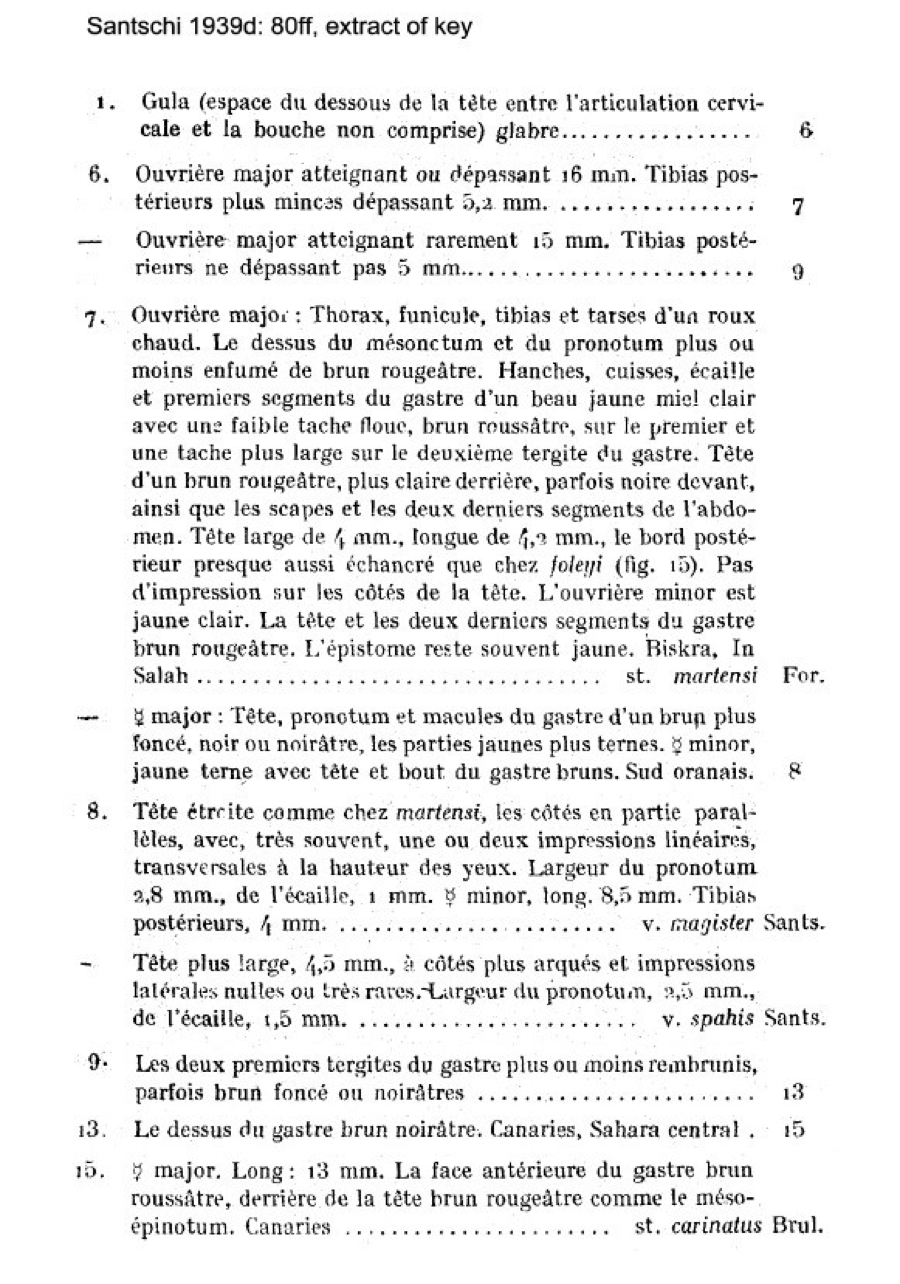 The foregoing,
leads me to propose the North African "C.
compressus" be designated as: The foregoing,
leads me to propose the North African "C.
compressus" be designated as:
Camponotus martensi Forel 1907, type location
Algeria, Biskra, collected by Martens, major worker;
Santschi, 1929g: 165, queen
junior synonyms brullei (Formica
Brullei, F Smith 1858b: 53, as replacement name for Formica
carinata, Brullé, 1840: 84
subspecies
carinata,
Santschi, 1939d: 82) from Canary Islands, but original
description unavailable
magister (Camponotus (Myrmoturba)
erigens st. magister, Santschi, 1925g: 357, major &
minor workers) from Morocco
occipitalis (Camponotus
maculatus r occipitalis, Stitz, 1917: 352, illustrated,
minor) from Algeria
rectinotus (Camponotus maculatus
r samius var. rectinotus, Stitz, 1917: 351
Camponotus
compressus st. rectinotus, Santschi, 1921d: 75, minor) from
Libya
spahis (Camponotus
(Myrmoturba) compressus st. thoracicus var. spahis,
Santschi, 1925g: 357, major, queen & male; listed as a variety of martensi
by Santschi, 1939d: 78) from Algeria.
|
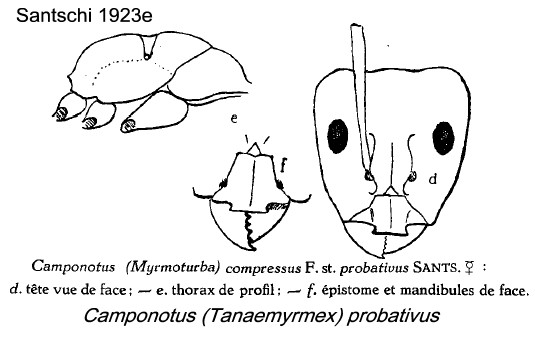 Sub-Saharan
Africa forms Sub-Saharan
Africa forms
The sole member is Camponotus
probativus from Mozambique which seems sufficently
distinctive to merit species status. It is possible that the record was
simply a migrant of the type form compressus. Santschi's
(1921d) description of probativus is at  . Arnold's (19226) translation of probativus
is at . Arnold's (19226) translation of probativus
is at  . .
|
|